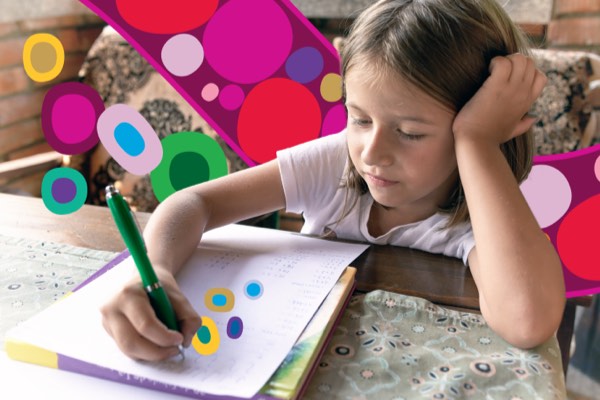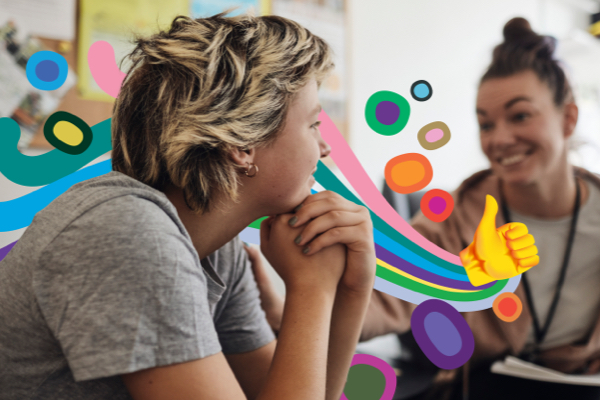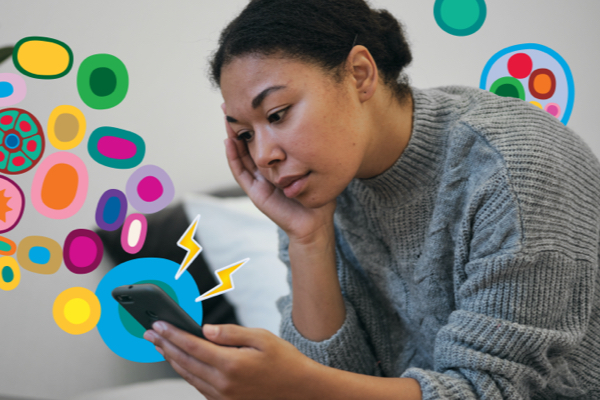How to identify and manage anxiety in children

When you’re a kid under 12 there’s excitement and discovery but it’s normal to be nervous sometimes, too. The world can feel overwhelming when it’s big and you’re small.
But what happens when those nerves transform into anxiety?
The Australian Institute of Health and Welfare reported that anxiety disorders were the second most common disorders among all children.
Fears and worries versus anxiety
Kids encounter new people, experiences and situations each day.
Most children learn to cope with any fears or worries that cross their mind. How? They naturally develop coping strategies that help them process change. While short periods of anxiety are normal in kids, a small number of children may need help to learn the required coping skills.
The signs a child may require support:
they feel anxious more than other children their age
anxiety stops them participating in activities at school or socially
emotional outbursts or tantrums
trouble with concentration
their fears and worries are out of proportion to the issues in their life.
How does anxiety affect children?
Anxiety gets triggered when the body senses a threat or danger.
Anxiety may lead to persistent worries or fears, and physical changes like an elevated heart rate, high blood pressure or sweating.
The physical reaction to anxiety may affect the way a child behaves and cause a disinterest in activities like going to school, socialising, playing sport or hobbies.
Other physical reactions may include:
stomach aches
headaches
restlessness
muscle tension
interrupted sleep
exhaustion
changes in appetite.
What causes anxiety in children?
There are many factors that can contribute to anxiety in a child including:
stressful life events like a death or illness in the family, divorce
major life changes
school tests
illness or injury
sporting events or a performance (school play, public speaking)
news stories about natural disasters or tragic events
bullying.
It can be a challenge to identify what causes anxiety in a child. Often, anxiety can develop without a single flash-point event.
Parents who experience anxiety may be more likely to have children with anxiety. A study found that hereditary factors are partly responsible for anxiety in children that can persist into adulthood. It’s important to get help to support your own mental health if you struggle with anxiety.

24/7 Medibank Mental Health Support
Medibank health insurance members can chat to a mental health professional about how they feel and ask questions about a range of mental health concerns for themselves or a loved one and get guidance on what they can do next. Chat online or call 1800 644 325 anytime of the day or night, 7 days a week at no extra cost.~
Types of anxiety
There are five common forms of anxiety in children.
1. Phobias
A phobia is diagnosed when objects, situations or events such as injections, spiders or heights bring about intense fear and avoidance, even though the threat of harm is small.
2. Generalised anxiety disorder (GAD)
Generalised anxiety disorder is diagnosed when kids have excessive and unrealistic worries. They often worry about things that might happen, about their own past behaviour, how good they are at their schoolwork or their own popularity. They often lack confidence and need a lot of reassurance.
3. Obsessive compulsive disorder (OCD)
With obsessive compulsive disorder a child has persistent unwanted thoughts, often about dirt or germs, or sometimes a need for symmetry. Young people will try to stop their thoughts and think a repeated action, such as washing their hands or counting, will fix the problem. Older kids usually recognise that the thoughts and behaviours don’t make sense even though they’re driven by them.
4. Social anxiety disorder
Social anxiety disorder, also known as social phobia, is when there are extreme levels of shyness or fear of a negative reaction. Children with a social phobia will avoid social interactions such as talking to new people, speaking up in class or performing in public. Children with social phobias may be highly self-conscious and have difficulty forming friendships.
5. Separation anxiety disorder
Separation anxiety is when a child fears being away from their main care givers. Often this feeling causes distress. Young children can lack the ability to understand why their care giver has left and when they’ll return. Older kids often fear that something bad will happen to a loved one if they are separated. Fear of separation is considered developmentally appropriate up to two years of age. Separation anxiety disorder can be diagnosed when distress in separation does not naturally reduce after this age and the intensity of the child’s anxiety remains severe. Crying, tantrums, and pleading can occur when the care giver attempts to leave the child, and general clinginess is common. Children may also complain about feeling sick at home and school, and they spend a lot of time in the sick bay, or refuse to go to school altogether. School camps and sleepovers can also cause major distress.
Some children may experience back to school anxiety. The start of a new term, a new year or even heading back to school after time spent in isolation can be a stressful time for children of all ages. For some, it can even be a source of anxiety but there are ways to make the transition easier.
Ease back to school anxiety by:
creating a calm home
encouraging your kids to talk about how they feel about school
introducing mindfulness and meditation
encouraging their passions
encouraging them to stay active and social
giving them the tools to feel confident; lunchbox that’s their favourite colour or a fun drink bottle.
Remember, most children have fears and anxieties from time to time. Children who need support will benefit from being seen by a GP for further examination and guidance.
How you can help with coping strategies
You can work with your child to develop coping strategies for their anxiety.
Here are four ways to support your child:
1. Acknowledge their fears or worries so it’s out in the open.
2. Encourage your child to try things even if they feel anxious – don't rush the experience and remember to praise their effort.
3. Wait until your child is anxious before you offer to help; give them time to work through how they feel.
4. Avoid labels for your child such as ‘oh she’s shy’ or ‘he’s an anxious one’.
Where to get help
If your life or someone else’s is in danger, call 000 immediately.
If you’re in distress and need help, call Lifeline on 13 11 14 for 24/7 crisis support.
For non-emergency support, your GP or regular health practitioner is often the best place to start. They will be able to assess your individual situation and recommend the best next steps for your recovery.
Medibank health insurance members can chat to a mental health professional about how they feel and ask questions about a range of mental health concerns for themselves or a loved one and get guidance on what they can do next. Chat online or call 1800 644 325 anytime of the day or night, 7 days a week at no extra cost~.
Remember that help is always available, no matter the situation.
This article was written in consultation with Beyond Blue. Medibank and Beyond Blue are working together to empower all people in Australia to be better connected with knowledge, resources and support to improve their mental health and wellbeing. Visit the Beyond Blue website for more information about anxiety.
How can we help?
I want to know how my cover supports mental health
I need help and want to talk
Related articles
Things you need to know
~Some referred services may involve out of pocket costs and waiting periods may apply.
While we hope you find this information helpful, please note that it is general in nature. It is not health advice, and is not tailored to meet your individual health needs. You should always consult a trusted health professional before making decisions about your health care. While we have prepared the information carefully, we can’t guarantee that it is accurate, complete or up-to-date. And while we may mention goods or services provided by others, we aren’t specifically endorsing them and can’t accept responsibility for them. For these reasons we are unable to accept responsibility for any loss that may be sustained from acting on this information (subject to applicable consumer guarantees).


